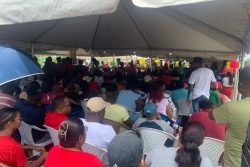Julian Hunte has advanced “one fundamental reason” why the West Indies Cricket Board (WICB) has spent US$6 million in the two as yet unsponsored Caribbean Twenty20 tournaments, the second of which comes to its climax with the final at Kensington Oval today.
“Fans want to see this version because they enjoy it as it is packaged in a manner which is convenient to their evolving needs,” the president wrote in the tournament brochure. “The players want to play it because it tests their skills in a different dimension and, of course, brings them a level of financial security which has not been historically available”.
As he ackno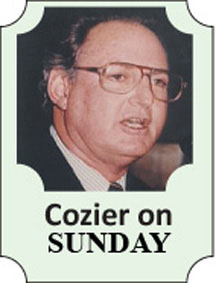 wledged later, there is more to why the tournament is “important and necessary”. While he envisioned returns on the investment in the future, he said it was now a platform for West Indies players to “showcase their wares” through the live television coverage of matches on ESPN’s global network.
wledged later, there is more to why the tournament is “important and necessary”. While he envisioned returns on the investment in the future, he said it was now a platform for West Indies players to “showcase their wares” through the live television coverage of matches on ESPN’s global network.
The 2011 tournament certainly gave fans – and, hopefully, ESPN viewers – the entertainment that has made Twenty20 so universally popular.
If the cricket itself was understandably not Indian Premier League standard, there were 166 sixes in the 20 matches for those titillated by big hitting.
There were heart-stopping finishes and the farce of Barbados losing their two allocated wickets off three balls without a run in the super-over playoff against Hampshire to determine the one tie.
Of the several collapses, none was more stunning than English county Somerset’s last five wickets for three to lose by one run to Guyana, showing that such sensations are not the preserve of West Indian teams.
Whatever happened yesterday, the team of the tournament, using team in its most literal sense, was the Windward Islands who advanced to the semi-finals with a group of comparative unknowns, each pulling his weight and more.
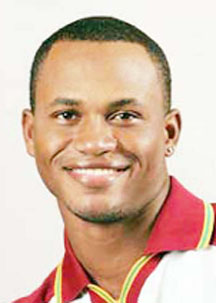
Some teams had more weight to pull than others, none more so that the Leewards whose massive 17-year-old Rahkeem Cornwall, from all reports a talented all-rounder, would not have been out of place in a sumo wrestling ring.
The major disappointment for the WICB was that both Barbados and the other “home” team, Guyana, given the multitude of Guyanese residents in Barbados, didn’t make it into the last four. It cut the attendance at Kensington Oval for the last two days by half and, even at the cheap $15 ticket price, cost as much as $80,000.
Whether the lucrative, well established T20 extravaganzas in India, Australia and England spotted another Kieron Pollard through their television screens during the past couple of weeks, as Hunte hoped, is doubtful. Time will tell.
If there is one who finds himself snapped up at the next IPL auction it would be Krishmar Santokie, the Jamaican left-arm medium-pacer. As he did in 2010, his block-hole precision was ideal to counteract big swinging bats. Other, more eminent fast bowlers, found that length and line, not pace, were essential over their four overs.
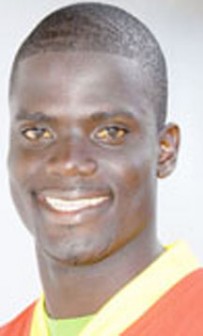
Santokie had 10 wickets last year at 5.55 runs an over. He had nine going into this year’s semi-finals at 4.64 an over. Eleven of those combined 19 victims were bowled, a telling detail. Generally, the overall exercise would have been more helpful to the West Indies selectors than the franchise owners in India or the coaches in Australia.
Clyde Butts and his panel only have to concern themselves with one, at most two such international matches per series. They also appreciate that the game’s briefest format bears as much relation to Test, and even 50-50, cricket as the 100 metres sprint to the marathon.
Yet, the peculiar backgrounds to a few performances gave them special significance.
The four highest scoring batsmen in the qualifying round – Marlon Samuels, Lendl Simmons, Andre Fletcher and Dwayne Smith – are all, for one reason or another, West Indies team discards. Each took the chance to make a statement in a high-profile WICB event.
It is Samuels’ second tournament since the end of his two year suspension for contacts with a reported illegal Indian bookmaker who is yet to be arrested and charged for his illegality.
In his every innings, he exuded a class above anyone else in the tournament, except for the exceptional Darren Bravo. Of course, he always did. It was only that such panache was never matched by his record.
He now has the forthcoming regional first-class season to persuade those who matter that, aged 30, he is worth another go, initially and realistically in the 50-50 team. For reasons that he apparently had explained to him during a meeting with Butts during the week, Simmons has been shunted aside since the one-day series in Australia just under a year ago.
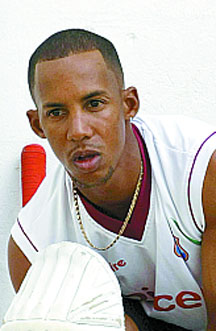
He is a versatile cricketer, a batsman capable of three first-class double hundreds, an athletic fielder, an occasional medium-pacer and even a useful wicket-keeper. Like Samuels, he doesn’t have supporting figures and, we can assume, did not enamour himself to the authorities with his approach to the game.
All things being equal, he would be a logical choice for the imminent World Cup.
Instead, he wasn’t even named in the original squad of 30. Like Samuels, the 2011 first-class season is vital to his future prospects.
As far as is known, Smith has no issues with the board or the selectors. It is simply his repetitive way of getting out – either bowled and caught on the mid-wicket boundary cross-hauling – that pulled the brakes on his international career three years ago.
Even though he marked his Test debut with a hundred against South Africa in 2003, a slack defence and a short concentration span mean the long game is not his thing.
It is his power-hitting, medium-pace bowling and electric fielding that brought him T20 contracts with Sussex in the English championship over the past three years, with two teams in the Indian Premier League (IPL) and, fleetingly, with New South Wales in Australia.
Promoted by Barbados as opener in the current T20, there were signs that he was hitting straighter and more effectively. It was a reminder to Butts and colleagues that, at 27, he is still around.
At 23, Fletcher is Samuels’ contemporary equivalent. A tall right-hand batsman, capable wicket-keeper and safe deep fielder, he has been given every chance to fulfil the potential the selectors clearly see in him. He is yet to take it after 19 ODIs and 11 T20 Internationals and the ‘A’ tour of Bangladesh, England and Ireland last year.
His time is running out. As other young players emerge, his leading batting role in the Windwards’ advance to the semi-final was timely. The weekend offered a further chance for him, Samuels (for Jamaica) and Simmons (for Trinidad and Tobago) to restate cases in need of restating.




